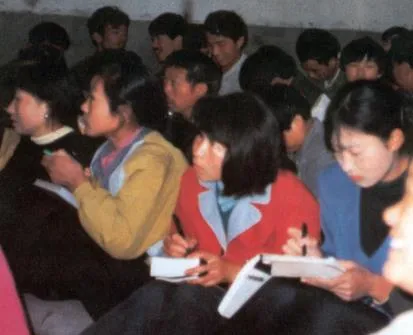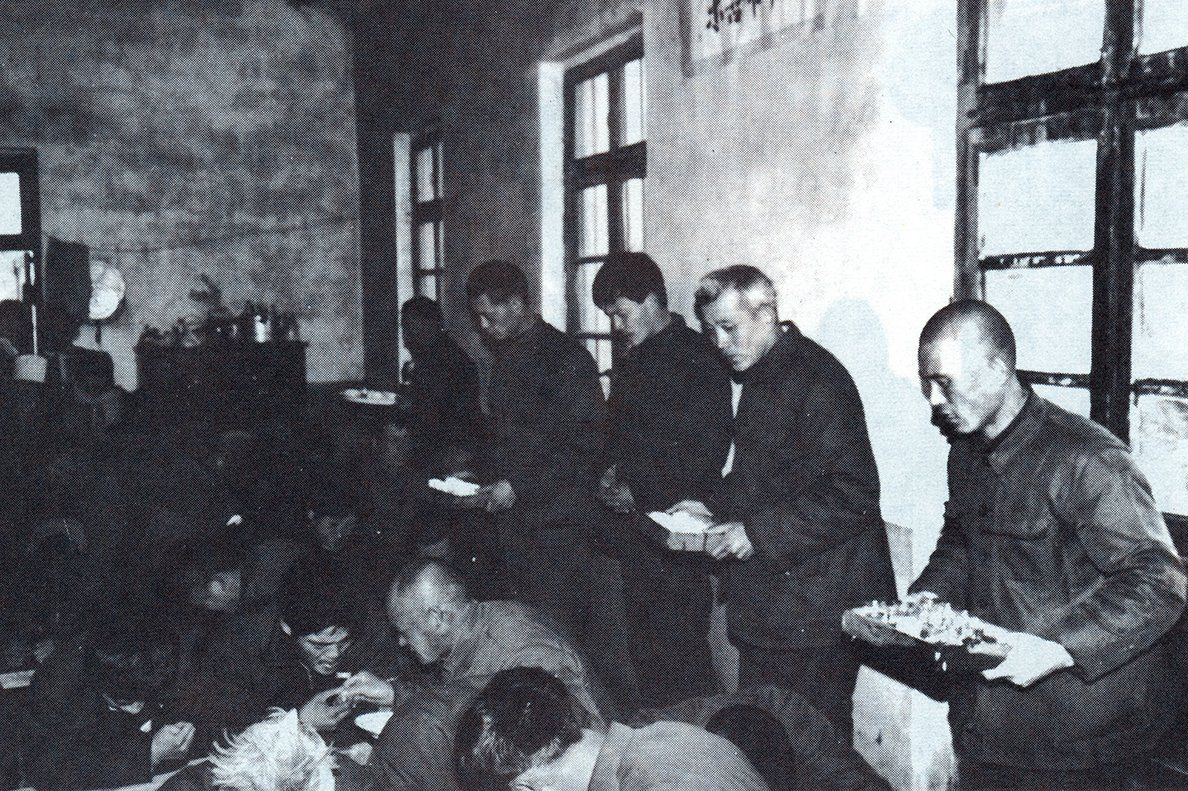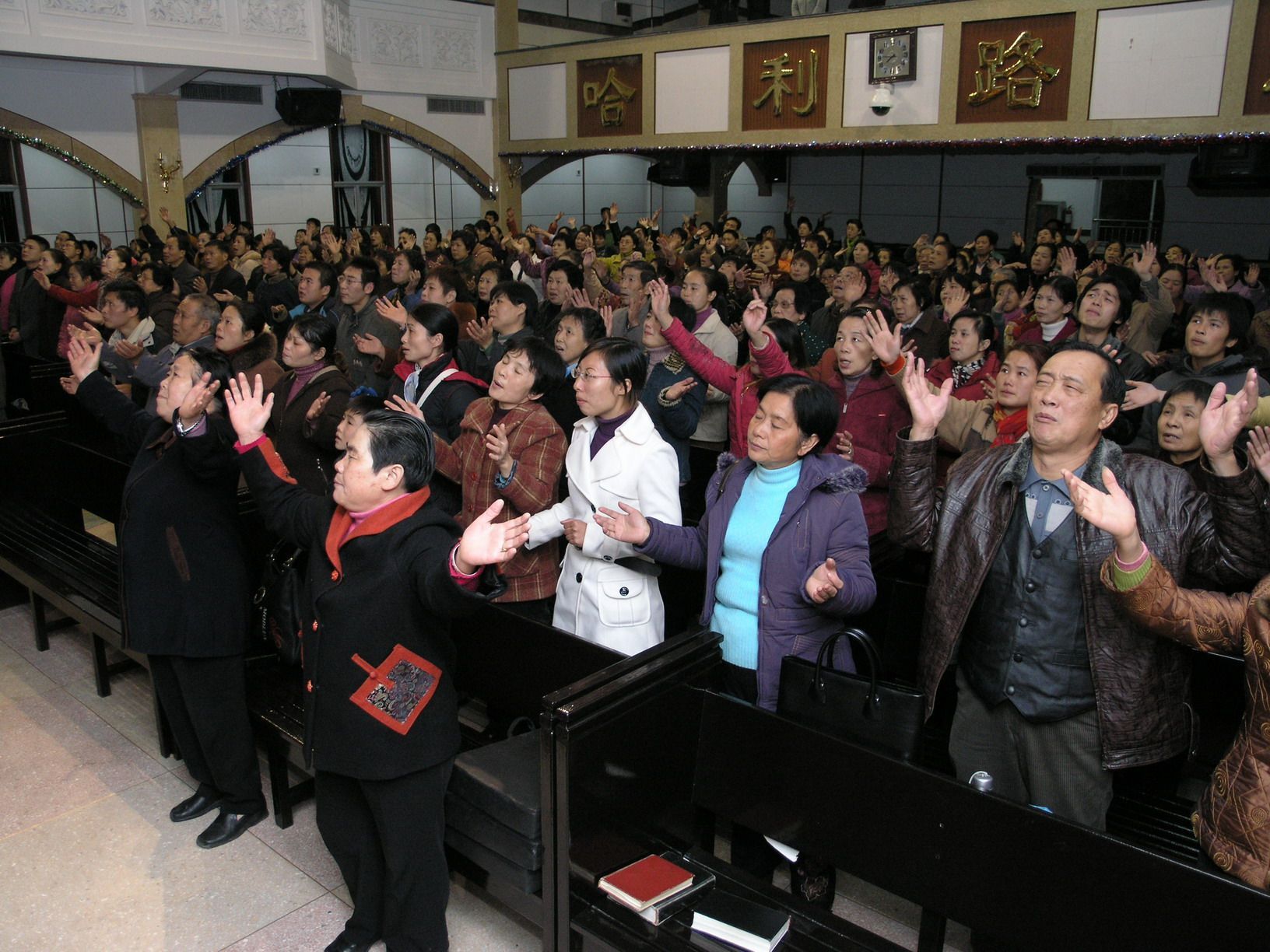1990s

Young Chinese women intently studying the Bible during the 1990s.
Cold Reception for Visiting Preachers
Because of its deep ties to Western denominations during the long missionary era, the Church in Shandong gained a reputation for being conservative and resistant to change. This has been a blessing in some ways, as a healthy skepticism helped them avoid much of the false teaching introduced both from overseas and other parts of China in recent decades. A reporter who visited churches in Shandong in 1993 found that "Many of them take a negative view of assistance from overseas believers, fearing that they will bring in harmful and divisive teachings. This past spring some of the leaders of the house church movement in the province convened a meeting in which they reaffirmed a policy of non-contact with overseas churches." 1
When Brother Yun—who later became well-known for his autobiography The Heavenly Man—visited Shandong in the 1990s, he and his co-workers were given a poor reception by a group of local believers, which was a typical experience for preachers from other provinces. The resistance against outside influence continues in various degrees to the present day. Preachers from Henan and other rural provinces tend to be looked down on by the more sophisticated and wealthy Shandong believers. Yun recalled,
"The key leader in Shandong prepared a meeting for seven days. On the afternoon of the sixth day, while Brother John was sharing, some of the Shandong believers started to find fault with our message. They quizzed us with some difficult questions about controversial verses in the book of Revelation.... One old man, an elder of a church, and two other men stood up and exclaimed, 'You teachers from Henan need to shut up! You’re so young and inexperienced. You are dirt-poor and know nothing. How can you teach us when you don’t even know the meaning of these Scriptures?'
The three old men picked up their belongings and started to leave the meeting, and they commanded their church members to leave with them. I immediately followed them into the courtyard and prayed in a loud voice, 'O Lord, thank you for my honorable brothers. Please help them not to be so angry because we are so ignorant of the Scriptures.'
Two of the disgruntled leaders laughed at me and called out, 'Yun, take your soldiers back to where you belong. Roll up your flag and take it back to Henan.'
I knew this incident was a disturbance from the devil. With sincere tears in my eyes I pleaded with them to return to the meeting so we could all pray and seek the Lord’s will. Their hearts were touched and they quietly returned to their seats. I asked everyone in the meeting to kneel down and seek the Lord. The love of God was poured out on all of us and there was much wailing and many broken hearts....
Those three elders came forward and knelt down in front of the people. They bowed their heads and said, 'Brother Yun, please forgive us for speaking such rude and insulting words.' The whole congregation, when they saw the contrite hearts of the three elders, knelt down and prayed with many tears. They asked us to stay and teach for several more days in different places around Shandong." 2
Growth and Persecution in the House Churches
Although visiting preachers may have received a mixed reception from some Shandong fellowships, the Holy Spirit continued to empower the messengers of the gospel, and the number of Christians grew exponentially during the 1990s.
A man named Huang and his wife placed their trust in Christ in 1988 after hearing the gospel via a shortwave radio broadcast. They gradually matured as believers, and found many people around them were also keen to know the truth. By the mid-1990s, the house group that met in the Huangs' apartment crammed into every available inch to hear the teaching of God's Word. On Christmas Day in 1995, a total of 56 people repented of their sins and believed in Christ in the home meeting. 3
In China, revival in the house churches is often followed by a season of persecution. In early 1996 the authorities cracked down on the Huang's house church, but when the police sirens blazed into the neighborhood, "the congregation was not frightened at all. The arrested leaders stepped into the police cars with heads held high. As the cars drove off, the congregation sang aloud from the Bible. As soon as the cars went out of view, the believers went back inside and continued their meeting."
The house church had been targeted by the authorities three years earlier. Huang recalled, "Last time, the sheep were intimidated and scattered. But now they have matured. We now look at persecution as a crowning glory, a blessing. The churches are more unified and our prayers more fervent. We believe that a larger revival follows persecution." 4
The Jesus Hospital

Members of the Jesus Family taking Communion together in 1992.
After the Jesus Family was apparently destroyed by the Communists in the 1950s and its leaders died, most observers thought that all memory of the unique movement would soon be forgotten. The movement of the Holy Spirit had planted the gospel deep with the hearts of the Jesus Family members, however, and the movement survived throughout Shandong Province.
In Linqu County, the Ai De ('Love and Virtue') Hospital was established right across the street from a former chapel of the Jesus Family. By 1995 the facility boasted 36 doctors and nurses, many of whom were nationally admired for their skill. Most of the hospital staff had family roots in the Jesus Family. One article revealed that at the Ai De Hospital,
"All staff members, from the director down to the cleaning lady, receive the same salary of 80 Yuan, hardly more than pocket money. To make ends meet, they still till their family fields, mostly before the clinic opens at 8:00 a.m. and after it closes at 5:00 p.m.
Due to the staff's modesty, fees are kept low. Patients come from far and wide. The seriously sick are pushed in on wooden wheelbarrows, a common mode of transport in China's remote areas. Since there is no medical insurance for poor peasants, many patients have a hard time settling their bills. In such cases payment is deferred, reduced or cancelled.
All staff members at the clinic are Christians. They begin each day with morning devotion at 5:30 a.m. and conclude with evening prayer at 7:30 p.m. Locals refer to it as the 'Jesus Hospital'. Doctors and nurses are used to giving personal witness and counseling their patients spiritually. In this way, countless patients have left the place more than just physically healed, and many have started a new life in Christ." 5
Wu Xiuling
Throughout the 1990s, reports surfaced from China that mentioned the remnants of the Jesus Family, including the grim story of a woman named Wu Xiuling, who was martyred in Shandong in March 1995. She was just 36-years-old.
Wu's troubles began in 1989, when a team of Public Security officers suddenly arrived at her home in Zhao Village near Zaozhuang City, and placed her under arrest. At the police station she was told she was in trouble because she believed in Jesus and because she had preached from the Book of Revelation—a part of the Bible particularly feared by the Chinese authorities. 6 Wu was allowed to go home after being repeatedly threatened.
Wu Xiuling's second arrest occurred in June 1993. A group of house church believers were meeting at a house in Weishan County, when suddenly a group of about 20 police officers arrived. They
“used guns and electric clubs to force the Christians to get onto the police truck and took them to the county Public Security Bureau. With hands cuffed, Xiuling was shown to the public around the county on a police vehicle for several days. Then she was taken back to the police station and interrogated for three months, during which period she was beaten so severely that injuries covered her body. She was sentenced to three years in jail after being tortured and humiliated.” 7
Wu Xiuling and two other arrested sisters were sent to a prison labor camp at Zibo in central Shandong. The prison manufactured clothing, most of which was exported overseas. Every day Wu was given a strict work quota that had to be completed, otherwise she would be beaten and abused. The quota was beyond her capability, and after a while her body began to break down from the constant pressure and beatings.
One day Wu fainted, but the guards shook her back to consciousness and forced her to continue working even though she had a high fever. Her request for medical assistance was firmly rejected. Finally, in October 1994, the prison authorities could see that Wu Xiuling was near death. They sent her back home for treatment. After two months she showed few signs of improvement. The treatment was discontinued because of a lack of money and one report noted, “Her bones were just under the skin, and her face was distorted. Her skinny hand became transparent and the bones could be seen. Her face did not show any trace of blood and her eyes had deeply sunk back. In early March 1995 Xiuling finally passed away at the age of 36.”
Wu Xiuling’s funeral was scheduled for March 6, but so many Christians wanted to attend that the police decided to block all the roads leading to the burial site, and the young martyr was buried without any witnesses. Wu had remained pure her whole life and constantly testified to the goodness of Jesus Christ. Much of her life had been spent in isolation and suffering, and even in death she was alone. She would not have minded, however, for she was already safe in the arms of her loving God.
Rapid Growth brings Spiritual Concerns
As the twentieth century drew to a close, the Church in Shandong had come a long way. Impressive numerical growth was seen throughout the 1990s, and in many places both registered Three-Self churches and the independent house church fellowships were filled to overflowing with people.
Some parts of the province experienced more Christian influence than others. Just in Linyi Prefecture in southern Shandong, the Three-Self Patriotic Movement in 1994 reported between 100,000 and 250,000 church members. 8 Although data on the house church networks in Linyi was more difficult to obtain, one source said there were more than 170,000 Christians in just "four poor counties" within the prefecture. 9
In Qingdao and surrounding parts of eastern Shandong, the churches had also greatly increased. By the end of the decade, Qingdao City had 50,000 registered believers meeting in 60 churches, 10 while in 1998 the official Amity News Service reported that 30,000 believers had been baptized in the city since 1980, "with a large unrecorded number of believers baptized before that date." 11 The house churches in Qingdao also experienced similar rates of rapid growth.
At Weihai, which overlooks the Yellow Sea at the northeast tip of the province, the government-approved Three-Self Church started with just 40 people in 1994. The Holy Spirit moved, however, and services were soon filled to overflowing. By the start of the new millennium more than 3,000 people attended the Christmas services at Weihai.
Similar accounts of growth were repeated from numerous counties and districts throughout Shandong in the 1990s. Province-wide, the Three-Self churches at the start of the decade had reported 307,000 members meeting in 2,464 registered churches. 12
By 1997, however, official sources listed 900,000 Three-Self Christians in the province, meaning the registered churches had nearly tripled in size in seven years. 13
Even those statistics are considered conservative, however, for the Three-Self churches typically only count baptized adult church members, and no children or teenagers are allowed to attend their meetings.
Because the illegal, unregistered house church networks had been forced to operate in the shadows, accurate estimates of their size in the 1990s are hard to ascertain, but with the registered churches reporting 900,000 members throughout Shandong, it can be reasonably estimated that the province contained at least two million house church believers at the same time.
Although by the late 1990s it appeared as if Christianity had blossomed spectacularly in Shandong and was on the verge of even greater growth, grave concerns were held by some China church watchers, who warned that the numeric growth of the Church had far outpaced the spiritual maturity of its members.
In keeping with the churches in many other provinces, a lack of trained pastors and the persistent shortage of Bibles combined to leave many churches without adequate leadership. Bible knowledge among believers was often superficial, causing missionary statesman Tony Lambert to repeat the lament of missionaries in Africa more than a century ago, who said, "The revival is a mile wide but only an inch deep."
© This article is an extract from Paul Hattaway's book 'Shandong: The Revival Province'. You can order this or any of The China Chronicles books and e-books from our online bookstore.
1. China Prayer Letter and Ministry Report (September-October 1993).
2. Brother Yun with Paul Hattaway, The Heavenly Man: The Remarkable True Story of Chinese Christian Brother Yun (London: Monarch, 2002), pp. 227-9.
3. Asian Report (May 1996).
4. Asian Report (May 1996).
5. "Tracing the Jesus Family," Amity News Service (March 1995).
6. Pastors with the government-sanctioned Three-Self Church in China are generally not permitted to preach from the Book of Revelation.
7. From a report on The Committee for the Investigation of Persecution of Religion in China website: www.china21.org
8. Bridge (August 1994).
9. China News and Church Report (June 16, 1995)
10. UCAN (April 24, 2000).
11. Amity News Service (January 1998).
12. Global Chinese Ministries (October 2003).
13. Amity News Service (September 1997).





